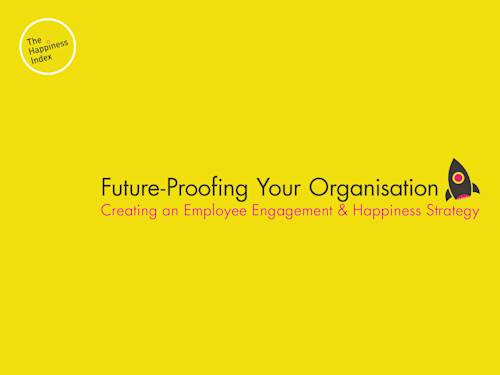
Creating an Employee Engagement AND Happiness Strategy
One of the questions we frequently get asked at The Happiness Index is whether happiness is down to nature or nurture? We all probably know at least one person whose personality naturally makes them optimistic and sunny, while we can probably think of someone who always seems a bit grumpy and down. Is this because the first person knows a secret piece of happiness-infused information… or is the second person disadvantaged because of their genes?
We’ve done a deep-dive into the science to find out what’s going on here. And unfortunately, there’s not a clear-cut answer. It seems that here – as in Star Wars – only Sith Lords deal in absolutes. However, there are loads of interesting studies and reports on how our genetics and the way we’re brought up impact our happiness, so let’s dive into the science and I assure you, you will have a greater understanding by the end of this article!
Those of you who really get into the weeds of science probably don’t need to hear this, but it bears repeating anyway. As ever with studies like this, the numbers we’re looking at are averages. Plus, lots of things affect your happiness from year-to-year, month-to-month and even day-to-day. In short, it would be impossible for me to give you an exact answer to any of these questions personalised exactly to you.
In my book, and in this blog post, I’m going to rely heavily on the work of Sonja Lyubomirsky, who you should definitely look up on YouTube – here’s a little taster,

After studying more than 2000 pairs of identical twins, Lyubomirsky came to the conclusion that it’s actually almost exactly 50-50. Her study showed that 50% of an individual’s happiness is decided by their genetics, and the remaining 50% is influenced by something that could, broadly, be called nature. Specifically, 10% of your happiness makeup is as a result of your environment; the job you have, where you live, etc. The remaining 40% is influenced by the way you think, which is the really exciting part, but more on that later.
“Is there a happiness gene?“
While Lyubomirsky’s research shows that 50% of our happiness comes from our genetics, it’s not 100% clear which genes specifically code for happiness. So far, ‘boffins’ in labs have managed to uncover over 300 genomes that they’ve linked to happiness. However, these genetic scientists reckon they’ve looked at genes that make up only around 2% of neurological differences, so there’s the potential for this number to grow a lot!
A Happiness set point
What scientists do believe is that there’s a set point that your genes help your body to achieve. Essentially your body is really good at keeping things exactly the way it likes to be – regulating your temperature, your ph, and even your weight to try to keep things on an even keel. In the same way, your body will release the hormones it believes you need to keep you at a good happiness level. Whether you agree with your body or not is a different story!
Your circumstances
When we think about our own happiness, we often put the most stock in what we’re calling our Environment. Typically, when we think about what would make us happier, we usually think about getting a better job, moving to a bigger house, or getting ourselves the latest phone, gaming console or even car. However, studies suggest that all of these kinds of things only add up to around 10% of your total happiness.
It’s worth noting here that if your basic needs aren’t being met, this may not hold. However, if you’re living a relatively affluent life, with a safe home, access to food, a comfortable place to sleep and so on, your actual environment only makes up a relatively small proportion of your overall happiness.
This seems really counter-intuitive, so it’s worth thinking about why this is actually the case. The reason for the low impact of the creature comforts we build up around us on our overall happiness is something that scientists call “hedonic adaptation”. This is a great phrase to use at the pub to make yourself look smart, but basically, it means that we get used to nice things. Getting new nice things is great for a moment, and then we get used to them too, and we start to want newer, nicer things. It’s a vicious cycle.
All of the elements we’ve talked about before you have limited control over – you don’t get a say in your genes, and actually when you think about it often the amount and kinds of stuff you have accessible to you are down to luck to a certain extent too. So let’s think about the things you do actually have control over, which is how you think. This actually makes up the majority of the nurture section of your happiness makeup. What scientists have found is that the way you think about all the stuff you have around you actually has the potential to make you much happier than the stuff itself. So fantasising over how great that new gadget is and how life-changing it will be, will likely dwarf the feelings of actually owning and using it!
Traditionally psychologists have studied mentally unwell people and tried to make them better, but Positive Psychologists have flipped the script and are looking at people who are particularly happy and are trying to help regular people replicate their results. From this kind of study, scientists have been able to isolate particular ways of thinking and behaviours that may make the rest of us happier too. These include things like practising gratitude, savouring good moments, and forgiving others and yourself, to name just a few.
This may make happiness seem like something you do all alone, but that’s far from the case. Community and sharing are big factors in how you think about the things around you. As always, relationships are key to human happiness. Studies show that sharing your gratitude and savouring good things with others is actually more beneficial to make you happy than doing these things on your own. Plus, you’ll have the added benefit that sharing your happiness often makes those around you happier too!
The great thing is that you can do a lot to impact this huge 40% chunk of human happiness in the workplace too! Expressing gratitude and praise for example has a huge impact on the happiness of your colleagues. Because relationships are such a key element to human happiness, ensuring you and your team have adequate time to get to know each other and build strong bonds is another way you can use your new-found knowledge about happiness when you’re at work.
Whilst I didn’t give you a definitive answer on the Nature vs Nurture debate, there is plenty here to give you a much deeper understanding of the triggers and measures of our happiness, and what we should focus on/avoid in our quest to be happier.
If you want a deeper understanding of all elements of happiness, then get your copy of Freedom to be Happy – the book that inspired this article!

Linked to Happiness in our neuroscience methodology... learn more
The Happiness Index helps organisations measure the key employee engagement AND happiness drivers to power their people strategy.
Our unique platform offers the products, insights and tools to shine a light on your cultural health and empower management to drive thriving cultures.
Our neuroscience-based pre-built surveys measure the full employee experience - from onboarding to exit to empower and enable organisations to understand their people and create data-led action plans.
